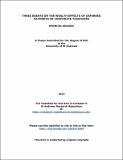Files in this item
Three essays on the wealth effects of deferred payments in corporate takeovers
Item metadata
| dc.contributor.advisor | Barbopoulos, Leonidas | |
| dc.contributor.author | Alexakis, Dimitrios | |
| dc.coverage.spatial | 182 p. | en_US |
| dc.date.accessioned | 2016-09-09T08:57:51Z | |
| dc.date.available | 2016-09-09T08:57:51Z | |
| dc.date.issued | 2015 | |
| dc.identifier | uk.bl.ethos.694544 | |
| dc.identifier.uri | https://hdl.handle.net/10023/9464 | |
| dc.description.abstract | In three papers, I employ parametric and nonparametric methods in order to further examine the determinants of value creation in M&A deals financed with contingent earnout payments. The first paper investigates the short-run wealth effects of earnouts in deals in which financial advisors are counseling the acquiring firms. The results suggest that relative to using non-earnout payments, acquirers enjoy higher abnormal returns from earnout use only when consulting financial advisors. Specifically, once accounting for potential selection bias, advised earnout-financed deals significantly outperform deals that are financed with: (a) earnouts without the involvement of financial advisors and (b) non-earnouts regardless of the involvement of financial advisors. Thus, the likely ability of financial advisors to efficiently address the inherent complexities of the design of earnouts leads to greater acquirer gains. The second paper examines the impact of the acquiring firm’s informational environment on the announcement period wealth effects of earnout-financing. The results suggest that under increased information asymmetry over the acquiring firm, the market’s reaction to an earnout-financed deal mainly reflects its inference that the acquirer’s stock is underpriced, rather than the deal’s synergy potential. To this end, earnout acquirers are illustrated to be relatively undervalued prior to the deal’s announcement. In contrast, the selection of earnouts by big acquirers with low information asymmetry sends a strong signal for value creation that also prevents market participants from inducing a size-related discount. Lastly, the third paper investigates the wealth effects of earnouts in international changes of corporate control. The results suggest that when firms choose to join a multinational network through the acquisition of a foreign company earnout-financing offers a major value-creating opportunity yielding greater announcement period abnormal returns to acquirers relative to domestic and remaining cross-border deals. In contrast, the likely presence of agency problems and monitoring costs appears to deteriorate the expected synergy gains from non-initial earnout-financed international M&As. | en_US |
| dc.language.iso | en | en_US |
| dc.publisher | University of St Andrews | |
| dc.subject.lcc | HG4028.M4A6 | |
| dc.subject.lcsh | Consolidation and merger of corporations--Economic aspects | en_US |
| dc.title | Three essays on the wealth effects of deferred payments in corporate takeovers | en_US |
| dc.type | Thesis | en_US |
| dc.type.qualificationlevel | Doctoral | en_US |
| dc.type.qualificationname | PhD Doctor of Philosophy | en_US |
| dc.publisher.institution | The University of St Andrews | en_US |
This item appears in the following Collection(s)
Items in the St Andrews Research Repository are protected by copyright, with all rights reserved, unless otherwise indicated.

